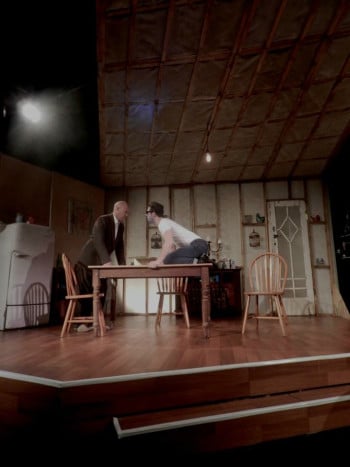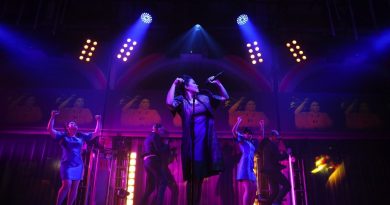Midsumma: The Fastest Clock
The Fastest Clock in the Universe, by UK writer (and perfomer, painter, photographer and director) Philip Ridley, is an exploration of beauty and the cost that comes from obsessive narcissism.
It’s about Cougar Glass (Robert Ricks) and Captain Tock (Ian Rose), who reside above an old fur factory, a place that resembles “one huge crack den”. They’re planning a faux-party, part of a repeating scheme to trick younger men, in this instance, 15-year-old Foxtrot Darling (Will Freeman), into sex. Cougar is obsessed with maintaining his youth and, aided by Captain and his landlady Cheetah Bee (Brenda Palmer), his warped perception of his own beauty is maintained: “I can have a gut full of maggots for all I care so long as I’ve got a suntan”. The party goes off without a hitch until Foxtrot’s girlfriend, Sherbet Gravel (Scout Boxall), arrives unexpectedly.
Ricks and Rose present strong characters as they drive through the majority of the first act, but are let down by pacing issues that leave parts somewhat lethargic. Issues with pacing also undermine the ascorbic humour of the writing and the ongoing ambivalent tone. The rhythm picks up when Freeman enters and the scenes involving all four leads are hilarious and full of energy, particularly during the second act. Special mention must go to Boxall who steals the show with her comic timing and physical expressiveness.
The set, a half-surreal, half-realist square room, encompasses fills the space with its roof reaching out over the heads of the audience. The set is characterised by its dirty walls, black grease-stains and model birds, which populate the space. As a bizarre mix of realist and stylised aesthetic, the set seems to emulate the performance style, which reads somewhat ambivalently: the performers are neither fully stylised nor naturalistic. Consequently, the performance seems to fall between two chairs. It is difficult to gauge the mood or tone of the piece; neither comic nor tragic, we are not certain about how to respond. Is it a tragic commentary about the disastrous effects of attempting to gain eternal youth or a satire on narcissism?
The work appears to be modelled on Wilde’s The Picture of Dorian Grey, yet its themes come across as a bric-a-brac of ideas about sexuality, the disastrous effects of attaining eternal youth and the imagined sordid underground of homosexuality.
It is here that the work becomes rather troubling. Cougar attempts to lure Foxtrot into having sex with him: he entices the boy into his home under the pretence of a party, ploys him with pornography and gives him a hand-job. The trouble is in the depiction of Cougar, an archetype that arch-conservatives have been deploying in their absurd critique of homosexuality for years. Here, the nefarious protagonist, who is what amounts of a paedophile (he’s 30, Foxtrot’s 15), corrupts a boy into performing “cardinal sins” and lures him into his sordid den of homosexuality (a “crack house”). But his plans are frustrated by Foxtrot’s girlfriend – pregnant girlfriend. The perception of Cougar as a corrupting force, a paedophile and an extreme narcissus completes the triad of anti-gay and is further supported with a story that reflects on the inability for homosexuals to reproduce and the archaic sentiment that they represent a threat to the greater survival of humanity. Seen in this light, it is surprising that The Fastest Clock was presented at Midsumma Festival.
The problematic symbolic dimension of the piece notwithstanding, the work done on the script is strong and, despite the pacing issues, the final impression of the piece is positive. It brings the energy, acidic humour and biting whiplash that seem to be called for in Ridley’s work and is presented by some talented and experienced performers.


